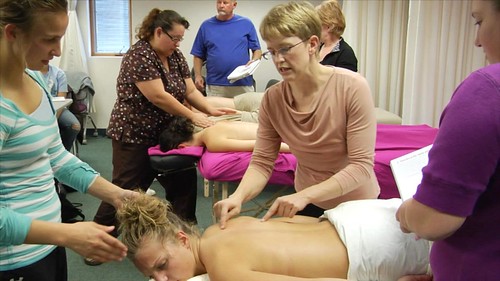Holistic Health Care Careers
Published by Nanni on Thursday, July 12, 2012
Photo credit by wistechcolleges
Holistic health care practitioners come from all walks of life. Careers dealing with holistic health are often the choice of those who previously worked in areas of traditional medicine. While many people who have never taken advantage of holistic health treatments assume that most practitioners are familiar with only one or two techniques, being successful in this type of career requires knowledge of many health-related issues.
Holistic health care considers physical, mental, and spiritual aspects of life interconnected and equally important to a patient’s well being. While many associate this care with alternative medicine, it’s increasingly found in traditional medical practices.
Many certificate programs in holistic health are available from trade or other types of proprietary schools. Some community colleges also offer this type of training. Online courses are plentiful.
The major career specializations within holistic health care include the following:
Massage Therapist
The ancient art of massage therapy treats painful ailments, reduces stress, and relaxes overworked muscles. A massage therapist can specialize in more than 80 different types of the art. Some of the most popular are deep tissue massage, Swedish massage, and reflexology. Most practitioners specialize in several types, all of which require different techniques.
Earnings vary considerably. Full- and part-time opportunities are available in a variety of settings such as private offices, hospitals, fitness centers, hotels, and airports. Standards for practicing vary by state and locality, but most areas require some type of formal education program plus passing a national or state exam. Training programs can last anywhere from three months to three years.
Acupuncturist
This practice comes to the Western world from China. It provides an anesthetic effect by inserting needles at various designated points on an individual’s body.
Acupuncturists need to have a thorough grasp of human anatomy, including the functions of various parts of the body. Manual dexterity is a must.
The standard for becoming licensed is certification by the National Certification Commission for Acupuncture and Oriental Medicine (NCCAOM). It takes between three and four years to achieve, but many training programs are available throughout the United States.
In 2006, income reportedly ranged from slightly more than $30,000 to more than $105,000 a year for U.S. acupuncturists. While those who worked for nonprofit groups averaged less than $35,000, practitioners working in hospitals received more than $65,000.
Acupressurist
Practitioners apply pressure to certain points on the body related to acupuncture points. They use the technique to subdue chronic pain, migraines, and backaches.
Since it doesn’t require needles, acupressure is typically classified as massage. Most practitioners receive their training from massage schools or from seminars.
Energy Healer
This is a broad field that includes any type of healing to smooth, manipulate, restore, or balance the body’s energy flow. Holistic professionals practice subtle energy healing, laying on of hands, polarity therapy, Reiki, and other techniques. They typically attempt to solve spiritual or emotional issues rather than focusing on a particular physical problem. Some integrate at least two types of healing methods in their treatment, such as flower essences, acupressure, craniosacral therapy, and spiritual therapy.
Energy healers must have comprehensive knowledge of anatomy and physiology. A background in psychology and training in basic counseling skills are also helpful.
Reflexologist
This type of holistic health practitioner uses a system of applying pressure to specified points on the patient’s hands and feet. Sometimes ears are also used. The underlying theories of reflexology have their roots in traditional Chinese medicine. The belief is that certain points on the feet, hands, and ears map to specific organs and tissues.
Working in reflexology as a career requires knowledge of anatomy and physiology, in particular, which reflexes track to specific parts of the body. Some reflexologists are self-employed and either have their own offices or call on patients in their homes. Many choose to work in clinics, private offices, or hospitals.
 | Posted in »
| Posted in »

1 comments: Responses to “ Holistic Health Care Careers ”
By Margaret M. on July 16, 2012 at 12:34 PM
Most of the alternative medicine we have today goes down to Chinese medicine origin.